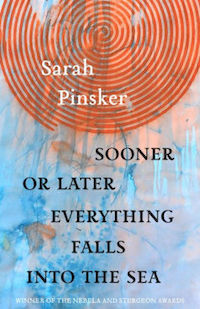The stories found within Sarah Pinsker’s collection Sooner or Later Everything Falls Into the Sea are a wide-ranging bunch. There’s a meticulously-constructed examination of life and culture on a generation ship; a tale of a young mariner endeavoring to outwit a group of sirens; and a neatly metafictional mystery involving a gathering of the Sarah Pinskers of various parallel Earths, including one who, just like the author, is a Nebula Award-winning writer.. But this book isn’t simply a showcase of its author’s range—although that’s certainly (and memorably) on display. Instead, it illustrates another aspect of her work: the ability to juxtapose meticulous worldbuilding with a thoughtful exploration of ambiguity.
The story “Wind Will Rove” neatly illustrates this. It’s set on a generation ship where, years earlier, an angry crew member deleted all records of arts and culture that arose on Earth. As such, the examples of earlier works are now reconstructions, based on the reports of those who might have heard certain songs or seen certain movies. But the story’s narrator Rosie, from a family of musicians, also has ties to the traditions of folk music, where to reconstruct a thing is also to remake it slightly; there is no perfect preservation, only a series of evolutions, as words shift into one another and something new is created. Over the course of the story, Pinsker evokes pain for what was lost in the cultural purge, but also nods to the way that art is inherently malleable; there’s no easy way to balance the two, and it’s all too simple for both memory and creation to stumble.
That’s not the only way that Pinsker evokes ambiguity to great dramatic effect in this story. Rosie’s generation is too young to have remembered Earth, but too old to survive to the point when the ship reaches its destination: for them, that balance of creation and preservation looms above all else. Pinsker is drawn to characters who elude easy binaries: the narrator of “No Lonely Seafarer” lives in a community whose access to the open water is marred by the presence of sirens. The narrator is enlisted to help with a possible solution to this, which may be due to — spoilers ahoy — their presence outside of a binary gender.
“And Then There Were (n – one),” which concludes the collection, is also built around a character who feels out of step with a larger society. In this case, that society is a temporary one, built around a gathering of Sarah Pinskers from parallel universes. Most of the Pinskers are scientists, including one who discovered the technology that made this event possible; the narrator, however, is an insurance investigator by trade, which makes her the closest thing to a detective on the grounds, and thus causes her to be asked to solve a murder of one timeline’s Pinsker by, assumably, another.
Buy the Book


Sooner or Later Everything Falls into the Sea
Here, too, there’s a sense of the minute as potentially revelatory: in a room full of your own doppelgänger many times over, you could see how decisions about relationships, careers, and residences might have played out. You could see (metaphorical) bullets dodged, or be surrounded by a sense of perennial regret. The conceit of the story is gloriously high-concept, but the emotions it stirs are primal, and point to essential facets of everyday life.
Even when Pinsker is working in a more restrained mode, these motifs are still very relevant. “Our Lady of the Open Road” centers around a punk band who’s perennially on tour. Luce, the narrator, is a cult hero to some, both for her music and for her decision, in a near future where live music is far more rare due to technological advances and security concerns, to continue the ages-old tradition of touring and playing in DIY venues. But even here, Pinsker offers up some welcome ambiguity: the representative of the technology that allows for live shows to be broadcast anywhere makes good points about questions of accessibility, and the tenuousness of Luce’s existence continuously comes up.
Sooner or Later Everything Falls Into the Sea is a collection where societal boundaries are both porous and rigid. To an extent, Pinsker is arguing that it’s those who exist outside of clearly designed roles are also the most perceptive about the flaws and mysteries of a given society, whether it’s a longstanding one or a temporary one that will dissipate after a certain event takes place. But, as is the case in “Our Lady of the Open Road,” she also notes that societies and cultures can often overlap, and an outsider in one society might well be an insider in another. Throughout the book, Pinsker demonstrates a virtuosity in creating lived-in worlds, but her real talent on display here is finding the ambiguous and liminal spaces within those worlds. There are no easy answers in these stories, but the questions Pinsker raises can be just as satisfying.
Sooner or Later Everything Falls Into the Sea is available from Small Beer Press.
 Tobias Carroll is the managing editor of Vol.1 Brooklyn. He is the author of the short story collection Transitory (Civil Coping Mechanisms) and the novel Reel (Rare Bird Books).
Tobias Carroll is the managing editor of Vol.1 Brooklyn. He is the author of the short story collection Transitory (Civil Coping Mechanisms) and the novel Reel (Rare Bird Books).










